#ludwig das kind
Explore tagged Tumblr posts
Text

Louis the Child (893-911), King of East Francia and Lotharingia. Illustration from "Die Deutschen Kaiser", by Max Barack (Julius Hoffmann, Stuttgart, c.1873).
#carolingian dynasty#full length portrait#louis the child#king of east francia#king of lotharingia#louis III#long live the king#god save the king#karolinger#king of germany#holy roman empire#heiliges römisches reich#reich#full-length portrait#max barack#julius hoffmann#die deutschen kaiser#ludwig das kind#kaisersaal
6 notes
·
View notes
Note
What was Patches doing before he became involved with the Clergy's construction? And what was his first encounter with Krulu and his vessel like?
[I know I have this more organized somewhere...]
Patches was, to put it bluntly, fucking around.
Having already come into his new identity as an undead by a long while, as well as not only discovering but learning to communicate with his unrequited second, Patches' attention had deviated from his study of higher beings to the realities he was confronted with rather forcefully.
First and foremost, he had spent a decent chunk of his time documenting the changes his body underwent as an undead. Because Patches didn't just wake up green, with a pumpkin for a head and a brilliant innate ability to understand his dullahan powers. He needed to study himself, his newfound inclinations, his strange episodes of "unconscious activity" (Stitches). This helped the monster distract himself from the existential grief of being dead, of realizing he missed many opportunities when he was alive.
At some point, that study deviated from knowing himself, to knowing the types of magic he was now having a lot more ease cultivating. Because, naturally, being a monster allows him to retain a lot more magical potential. This took a massive length of time, explaining why he's as clever and apt with several types of magic as he is. Lending special attention to the undead, fire and plant types.
Patches had been living his life still pursuing his various studies and finding ways to integrate himself in various societies, in certain areas of the world where monster populations were highest.
At this point in time his perception of his identity when alive has been deteriorated. He no longer remembers his birth name (Fábio da Cruz) or his appearance, and the artifacts that would allow him to recall how he looked are gone as well. His clothes, his head/skull, his first notes, gone. He knows only the name he'd been given by some, Patches.
This, in turn, is how he meets the triplets. At a concert, actually. Although certainly not reborn in that time period, Patches witnessed the birth of metal, rock and adjacent genres. He met the demon brothers at some kind of mental concert, having lost himself in a metal head phase. One thing leads to another and he's getting drunk with the three, then his head is being used as a punch bowl, and the night ends with everyone limp as corpse on the ground.
They become unlikely friends, especially Ludwig and Patches specifically.
Becoming a trusted friend, Patches gets to witness the moment in time where Ludwig meets you/Admin. He's present when things get difficult, when Lud's crush becomes the vessel to something so much bigger than everything they'd ever seen up until then.
And the sight, the notion, of a siadar on Earth rekindles the fanatic interest he once sported, the thing that got him killed.
It can't be said that Patches' intentions to help Ludwig help you/Admin create The Clergy's Eye are entirely selfless. Sure, he wants to get his friend out of a hard time, but he mostly wants to get closer to the literal god.
It turns out his skulls are useful enough to keep him in close contact with you/Admin and Ludwig during the initial stages of The Clergy's Eye's creation. He becomes a core of the project, gets to see powers and abilities beyond his understanding, gets to have that observation-participation data he so desperately scraped for when he was alive.
Patches knows that, at some point, he was essentially selling himself to an entity of dubious moral standing for answers to questions he'd been plagued with. But why should he care, right? He's already dead, he has nothing to lose.
He's technically the second worker of the establishment. The first being Ludwig, who eventually distances himself.
54 notes
·
View notes
Text
Since the days of Tatort München are counted, here's a list of things I want to happen in the last episodes:
Franz und Ivo müssen sich random als Ehepaar ausgeben, vielleicht während sie wen beschatten ("Schau mal... Liebling... Die Gardinen könnten doch zum Wohnzimmerteppich passen")
callback to any of the older episodes (bonus point for any kind of carlo mention or dropping an episode by its name)
fourth-wall break (Kalli schaut in die Kamera und sagt: "Seit über 30 Jahren sind die schon so drauf")
Ludwig (meinetwegen auch nur kurze Erwähnung im Nebensatz)
Franz zu Ivo: "Denkst du in einem anderen Universum bin ich dich endlich los?" Cut zu Udo und Miro in Setstühlen, die nur betreten den Kopf schütteln
Ivo kocht mal wieder
Eberhofer Anspielung
Franz ukd Ivo sind beide krank und Kalli muss alleine ermitteln
casuale Erwähnung, was sie alle in der Quarantäne getan haben (Franz hat seine Platten umsortiert und neue auf Ebay Kleinanzeigen erworben; Ivo ist ständig more or less legal nach Kroatien gefahren und Kalli hat sich selbst Stricken beigebracht
Kalli rockt den schwarzen Rolli Franz-style (in derselben Folge trägt Franz gleichzeitig auch endlich mal wieder einen Rolli und Kalli sagt: "Och Mensch, man könnt ja fast meinen, das wäre geplant gewesen")
Feel free to add something.
#tatort münchen#franz leitmayr#ivo batic#carlo menzinger#kalli hammermann#now obv nothing of that is gonna happen but a girly (gn) can hope
62 notes
·
View notes
Note
Do the mercs often interact with their other team counterparts? (other than the Medics of course) Do they have opinions of eachother? :0
Sort of! Aside from the Medic brothers I can summarize a small list of the dynamics between the counterparts!
The Scouts sorta get along somewhat, tho they do bicker like most siblings would like getting in brawls or calling each other names :P (Only reason Theo is a bit nicer to him is because they have a shared dislike for Pierre)
The Pyros may as well be besties cuz they immediately act as if they grew up together 💖 If they were left to their own devices they'd probably burn both bases down in a matter of seconds (also Kasai is much shyer than Cyrus)
The Soldiers kinda dunk on each other constantly and nobody can tell if it's all in good fun or if they genuinely are trying to one up the other. Who knows? Could be both!
The Heavys are casually polite to each other but otherwise don't ever interact with one another. They do talk to each other about their families tho! It's kind of a comforting way for them to not forget that the enemy they kill each match are also living people with their own lives
The Engineers get along very well and have actually collaborated on a few projects together under the Administrator's nose :3c their mutual respect has its limits tho, they do know better than to get too friendly with the enemy
The Demos are kinda like long distance friends! They go out to drink once or twice every few months to catch up. Only reason the Administrator hasn't done anything about this is cuz Tavish always forgets they're friends (cuz of da brain scooping from Ludwig) after hanging out so he's still ruthless during matches, yet he has their hang out days marked on his calendar so he doesn't forget to meet up
The Snipers are like oil and water. Neither get along but they also don't hate on the other. Assassins are polite and respectful after all! Also Austin is a rambler kind of talker while Ethan is completely mute and simply listens
The Spies don't talk to each other much even tho they are aware of their familial relation (that doesn't mean they don't care of course >_> they just hide it very well). Maxime tends to talk more to Axel tho in terms of whose sibling relationship is stronger. Pierre keeps to himself a lot so he barely has much a bond with them
Their opinion of their teammates' counterparts tho is a whole different story and I'm not about to make an ENTIRE blog post about that or it'll be too long and boring 😂
#had this ask in my drafts so I thought I'd go ahead and answer it ^^#ask box#team fortress 2#tf2#tf2 mercs
23 notes
·
View notes
Note
dunno enough about your fav hetalia ships, so feel free to just attach it to the most fitting favourites
OTP (or ship of choice) has to suddenly take care of a child or (feral) animal, how would they react? who would do well
who would be a karen at a restaurant for their patner(s) who got a wrong order at the restaurant, how would both react?
who is the most likely to be completely oblivious while the other is constantly trying to confess their feelings, maybe even actually doing it but person a just doesnt get it? how would they finally find out ?
I'll try to answer something for all of those! Sorry if it isn't all primarily related, da OC AU brainrot ...
Herakles has tons of stray cats at home and the track record with Sadık is mixed. He loves the cats in general and many like him, some don't, some are indifferent. There is one black kitten that loves him more than it does Herakles and he dotes on it so endlessly. It responds without a fail to "Kedicik." I hope I used the right I's.
Not the Karen thing, but restaurant related - Michele (Sicily OC) has had a few occassions where he wanted go beat Paddy over the head with the bread basket. (Paddy is a Human OC and basically a kind of surrogate father/uncle figure for Harry, my Ireland OC). Paddy so shamelessly asks for more food and in general does things that Michele finds rude/embarassing. Harry is lucky he's so fuckable and literally the man of Michele's dreams, bc his aversion of father figures makes Paddy a NIGHTMARE.
Honestly, kinda GerIta behaviour. Still. on my ao3 (also breitzbachbea) I have a very recent GerIta fanfic called Two hearts alas! reside in my chest, where two of Ludwig's friends try to figure out a) if Feli is flirting and b) if Ludwig is gonna notice it.
#beareplies#aph#hws#hetalia#anon#aph greece#hws greece#aph turkey#hws turkey#aph turgre#hws turgre#turgre#hetalia oc#aph sicily#hws sicily#aph ireland#hws ireland#sicire#gerita#aph germany#hws germany#aph italy#hws italy#paddy
9 notes
·
View notes
Note
Hah… that makes two of us, that’s definitely a struggle on my part. Social cues are very difficult to read, to be fair. But omg I am just so happy for you two! I can’t wait to see what kind of personalities the little ones will have when their older, wonder which one will become the wild child like their mom/dad… hehe 🤭 How did the others react when they knew you were expecting Medic? I’m sure it was quite the shock. Scouts reaction was probably the funniest
Ludwig looks up at Mikhail with a grin, "I think they meant you when they talked about a 'wild child'."
"Doktor!"
Ludwig giggles, "Hoo, I may have all the necessary parts, but I am most decidedly a man & not a woman. As for the team's reactions," He shrugs, "Well, I wasn't there to see it."
Mikhail groans, knowing he will have to tell this part of the story, "Engineer give me earful. Sounded like my mama," Misha tries, but fails, to imitate Dell's Texan accent, "What you think you are doing, boy? If I hear you hurt doktor, I will show you how we deal with men like that in Texas!"
Ludwig looks mortified, "Dell said that? To you?"
Mikhail hangs his head, "Da. Pyro & Scout were not better," Now he is trying to imitate Scout's Boston accent, "What sort of boyfriend are you! Doktor got kidnapped, & all you can say is 'oops?' Take responsibility, lardass. Blah, blah."
Ludwig doesn't know if he should laugh or cry, "At least... At least it's nice to know the team cares?"
Mikhail sighs, "Everyone on team loves doktor, but Heavy loves doktor most & would never hurt him."
"Of course not, Lieber."
"Da. Oh, but Soldier's reaction was funniest."
"Oh, was it?"
"He say: it was long time coming."
Ludwig, once again, looks mortified. He covers his face with his hands & groans.
9 notes
·
View notes
Text


Die liebsten Gedichte des Königs (1/12)
Beginnen wir mit einer hochgeliebten Ballade von König Ludwig II. von Bayern. Dieses nachtschwere Gedicht drückt Ludwigs Hang zur Romantik, aber auch seine tiefe, ewige Todessehnsucht aus. Um Missverständnissen vorzubeugen: Ludwig suchte nach der Ewigkeit, dem Unzerstörbaren, dem Erhabenen. Er erkannte jedoch, dass alles auf dieser Welt zerstörbar ist. Vielleicht faszinierten ihn deshalb das Motiv von Tod und Erlösung? Der Erlkönig stillte seinen poetischen Durst nach diesem dunklen Elixier...
Erlkönig
1782.
Wer reitet so spät durch Nacht und Wind? Es ist der Vater mit seinem Kind; Er hat den Knaben wohl in dem Arm, Er faßt ihn sicher, er hält ihn warm. Mein Sohn, was birgst du so bang dein Gesicht? — Siehst, Vater, du den Erlkönig nicht? Den Erlenkönig mit Kron’ und Schweif? — Mein Sohn, es ist ein Nebelstreif. — „Du liebes Kind, komm, geh mit mir! Gar schöne Spiele spiel’ ich mit dir; Manch’ bunte Blumen sind an dem Strand, Meine Mutter hat manch gülden Gewand.“ — Mein Vater, mein Vater, und hörest du nicht, Was Erlenkönig mir leise verspricht? — Sei ruhig, bleibe ruhig, mein Kind; In dürren Blättern säuselt der Wind. — „Willst, feiner Knabe, du mit mir gehn? Meine Töchter sollen dich warten schön; Meine Töchter führen den nächtlichen Reihn Und wiegen und tanzen und singen dich ein.“ — Mein Vater, mein Vater, und siehst du nicht dort Erlkönigs Töchter am düstern Ort? — Mein Sohn, mein Sohn, ich seh’ es genau: Es scheinen die alten Weiden so grau. — „Ich liebe dich, mich reizt deine schöne Gestalt; Und bist du nicht willig, so brauch’ ich Gewalt.“ — Mein Vater, mein Vater, jetzt faßt er mich an! Erlkönig hat mir ein Leids getan! — Dem Vater grauset’s; er reitet geschwind, Er hält in Armen das ächzende Kind, Erreicht den Hof mit Mühe und Not; In seinen Armen das Kind war tot.
Johann Wolfgang von Goethe
4 notes
·
View notes
Text


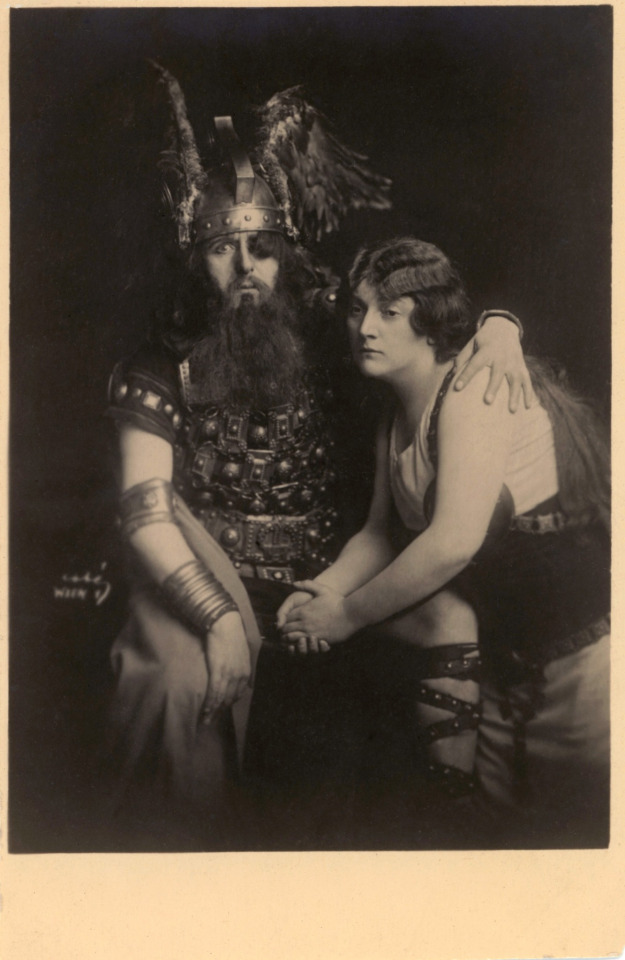

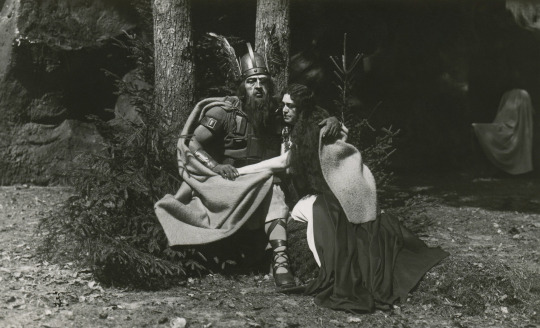


„WALKÜRE“ R. WAGNER / THIRD ACT
„DIES EINE MUSST DU ERHÖREN! ZERKNICKE DEIN KIND, DAS DEIN KNIE UMFASST“
Wotans and Brünnhildes
? as Wotan and ? as Brünnhilde; Nantes, 1903
Baptist Hoffmann as Wotan and Melanie Kurt as Brünnhilde; Berlin, ?
Alfred Jerger as Wotan and Käthe Rantzau as Brünnhilde; Vienna, 1924
Rudolf Bockelmann as Wotan and Nanny Larsén-Todsen as Brünnhilde; Bayreuth, 1927
Ludwig Hofmann as Wotan and Nanny Larsén-Todsen as Brünnhilde; Zoppot (Waldoper), 1934
Wilhelm Rode as Wotan and Henny Trundt as Brünnhilde; Munich, 1933
Rudolf Bockelmann as Wotan and Frida Leider as Brunnhilde; Bayreuth, 1936
#classical music#opera#music history#bel canto#composer#classical composer#aria#classical studies#maestro#chest voice#Die Walküre#The Valkyrie#Richard Wagner#Wagner#Der Ring des Nibelungen#The Ring of the Nibelung#Norse mythology#Völsunga saga#Poetic Edda#Germanic mythology#classical musician#classical voice#classical history#classical art#musician#musicians#music education#music theory#history of music#historian of music
18 notes
·
View notes
Text
Rarepair Week 2023 - Day 5
@hetalia-rarepairweek
Prompt: Historical || Meet the Family
Rating: T
Pairing: GerCan
Word Count: 900
Read on AO3
Cw: Temporary character death, violence, minor depictions of blood
Forgiveness
Matthew had always thrived in the quiet and shadows. Soft steps, never heard until it was too late. For decades it had gotten him into trouble or left him overlooked, but now, in war, it was his time.
He wanted to be a pacifist. He saw the damage war did to his guardians' bodies. Blood still made him squirm, even after years of caretaking. He didn’t want to think of how much of his family’s blood splattered his hands. Some nights, he dreamed it was still there.
But now…Now it didn’t have to be that way.
He crept across No Man’s Land, Arthur and a handful of their men in tow. Approaching the enemy trench, Matthew peeked in, ears perked to the slightest sound. He nodded to the others when he deemed the coast clear.
Without a sound, he jumped into the trench. Always forgotten, always overlooked, and now it would be his advantage. Stalking through the muddy walls, across the duck boards, mindful of how much they made them creak. They’d have company soon, Matthew could tell. He had been on enough raids that he formed an intuition.
“Wer ist da?” the darkness called ahead.
Everyone froze, breath held tight in their throats.
“Ich schieße.”
Matthew reached for his knife.
“Matthew…” Arthur warned, voice low, “Don’t be rash now–” A bullet nicked his shoulder. He took in a sharp breath. “Matthew–”
But Matthew had already bolted into the thrush of darkness.
It was all a blur. Killing often was. Red splattering across his vision, the distant sound of screams. It seemed far away, but natural. Too natural.
Ludwig lay before him in a puddle of his own blood. Matthew’s stomach jumped to his throat and yet…he was grinning. He hated it, yet he just kept staring.
“Matthew…You–” Arthur’s words died in his throat, eyes landing on Ludwig. “Oh Matthew…”
Arthur reached for him, but Matthew jerked away, stepping over the body as if nothing had happened.
— — —
Back and forth. Creak, squeak. Something needed to be oiled, but Matthew was too comfortable against the chest of his lover to care. It may have been sweltering, so much so they had discarded their shirts long ago, but Matthew refused to let it ruin his cuddle time.
Fingers trailed along the scars that sprinkled his lover’s torso and chest. Scars put there by him.
Back then he had been blinded by rage and revenge. Failing to realize the bigger picture. Now, in an era of peace, somehow Matthew had found himself falling for the man he wouldn’t hesitate to turn into Swiss cheese with bullet wounds not even a century ago.
The hot summer day spent curled up together on a porch swing couldn’t have been more different from the wet cold night of a trench raid when every fiber had to be on high alert. When the animalistic desire deep within him battled to be free. When it often won.
Each time his fingertips bumped along the jagged skin, a sick kind of pleasure bubbled from deep within Matthew. He did all that. He couldn’t tell if it was his lingering rage from the world wars or a sense of possessiveness that Ludwig was his. That in a way, those marks made Ludwig his. Regardless, Matthew was disgusted with himself.
Nations were bred for war. For violence. At least that’s what Arthur always said. That it was in their nature to be possessive, to solve their problems with a sword or gun or whatever was the popular weapon of the time. Matthew only saw it as an excuse. He had vowed to never be like Arthur. To never be like Francis. Or any of those empires who practically fed on the blood of their enemies.
But he failed. He was just like the rest of them. A sick, twisted, monster.
Yet…Ludwig lay there with him. Eyes closed in bliss despite the heat and sweaty body against him. Completely defenseless. How they could forgive each other after everything was lost on even Matthew who forgave so easily.
“You’re lost in that head of yours again aren’t you?” Ludwig’s voice broke through the train of thought.
“Huh…Wha–”
Ludwig’s chest rumbled with a chuckle. Matthew liked it when Ludwig laughed. At least he could say he preferred it over his screams of agony.
“I’m serious though Matt. What’s wrong?”
“Nothing.”
“It’s not nothing. I–”
Matthew pressed his lips against Ludwigs, lazily rolling them against his lovers. He kept Ludwig in place with a single hand pushing gently against his chest. He licked into Ludwig’s mouth, Ludwig gripped Matthew’s thigh, timid tongue meeting Matthew’s.
“Don’t…Don’t think you’ve distracted me,” Ludwig panted, eyes glassy, “I will find out what’s wrong–”
Another kiss. Even longer and slower than the last. “Fine…Something’s up but…I just need you and I’ll be fine.”
Ludwig searched Matthew’s eyes. Desire burned deep within, but also cold, pained desperation. He shivered as Matthew’s fingers traveled over an old stab wound, long since scarred. A wound put there by Matthew. Ah. That was it, wasn’t it?
“Okay…” Ludwig agreed, voice careful, “Okay. But let’s take this inside.”
He pulled Matthew up to his feet, arms wrapping around him for a quick embrace. Noses brushing, Ludwig whispered: “I love you.”
A small smile spread across Matthew’s lips, eyes shifting down to his feet. Bashful. Cute. “I love you too.”
Translation
Wer ist da = Who’s there?
Ich schieße = I’ll shoot
#hetalia#hws#rarepairweek#rarepairweek2023#hetalia-rarepairweek#gercan#canger#hws canada#hws germany#fanfiction#hetalia fanfiction#my writing
23 notes
·
View notes
Text
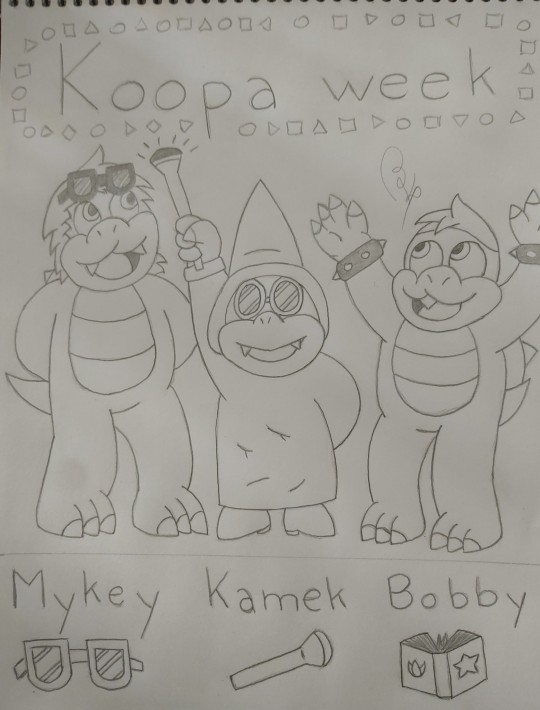
((And finally, here are the three remaining Koopas that also belong to the Koopa family. They are...
//
Y para finalizar, aquí están los tres Koopas restantes que tambien pertenecen a la familia Koopa. Ellos son...))
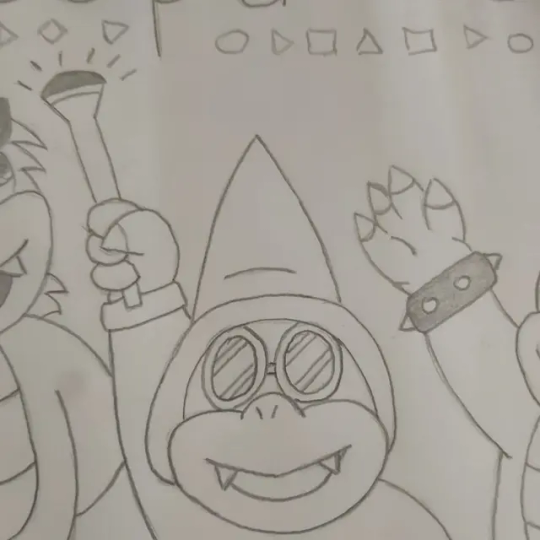
BOWSER
Kamek, my faithful right hand and mentor. He has accompanied me throughout my life in the castle. He is usually very organized and knows a lot of things. His specialty is magic. He helps my children with his own magic. He is always there when he is needed.
//
Kamek, mi fiel mano derecha y mentor. Me ha acompañado durante toda mi vida en el castillo. Suele ser muy organizado y sabe muchas cosas. Su especialidad es la magia. Él ayuda a mis niños con su propia magia. Siempre está ahí cuando se le necesita.
____________
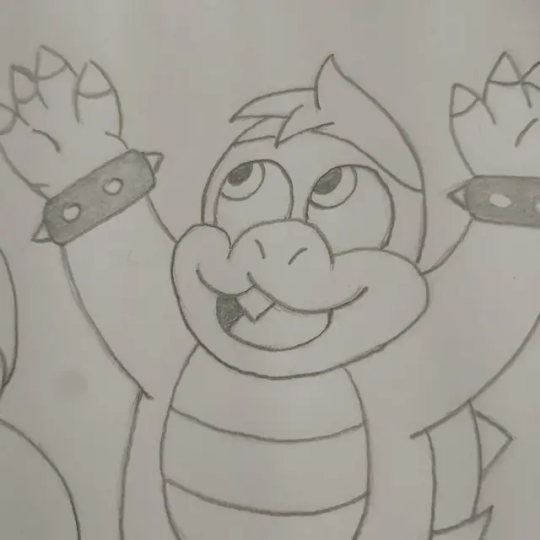
LARRY / JR.
Bobby is our best friend. We love spending time with him, even though we argue with each other. He likes reading and fairy tales. Many times, when we are in a bad mood, he encourages us and plays with us.
//
Bobby es nuestro mejor amigo. Nos encanta pasar tiempo con él, aunque discutamos entre nosotros. Le gusta la lectura y los cuentos de hadas. Muchas veces, cuando estamos de malas, él nos da ánimos y juega con nosotros
____________

LUDWIG
Mykey is... a great guy, I must say. He's friendly and everyone here likes him...... I don't really know him that much but... oh what the hell! He is a great friend and a great big brother. I have to admit his sunglasses make him look great and when he puts them on he is kind of scary. I always see him smile, I guess it's the best quality of him. I look forward to meeting him more in the future.
//
Mykey es... un gran chico, debo decir. Es amigable y le agrada a todos aquí...... realmente no lo conozco mucho pero... oh, qué demonios! Él es un gran amigo y un gran hermano mayor. Debo admitir que sus lentes lo hacen ver genial y cuando se los pone da algo de miedo. Siempre lo veo sonreír, supongo que es su mejor cualidad. Espero poder conocerlo más en el futuro.
#koopa week#koopalings#español#english#koopa oc#mykey koopa#bobby koopa#fanfic#traditional art#sketch
6 notes
·
View notes
Text
Oppenheimer Review
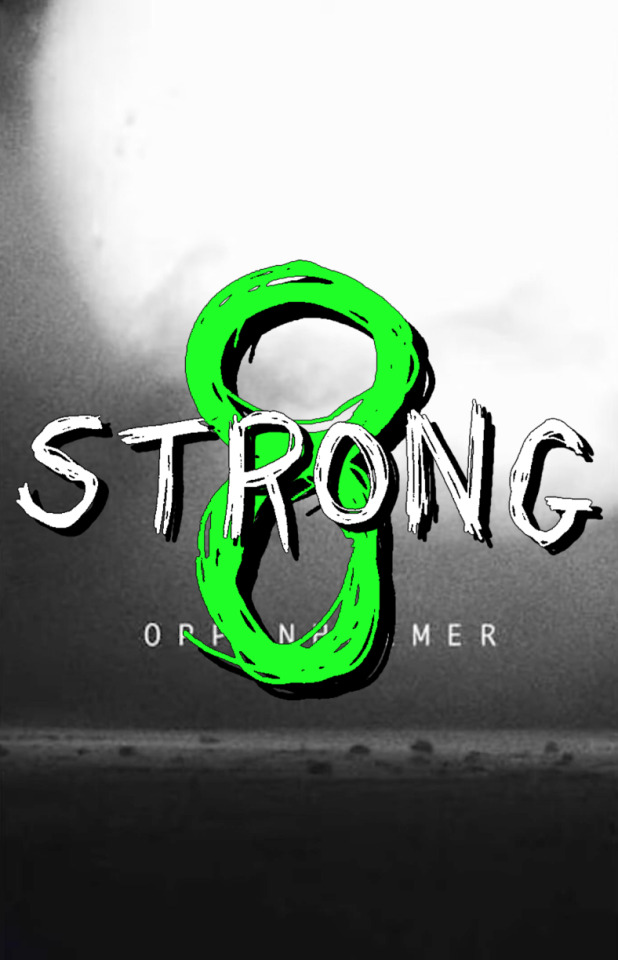
First of all, I think Oppenheimer is a technical masterpiece. An audiovisual marvel. It's Nolan's best work in that regard, a completely new level for him, and an incredible achievement. Editing-wise, it's remarkable too. People have said that the writing can be over-written and that it struggled to breathe. There are a lot of time jumps, and I didn't follow everything in detail, but it never struggled to hold my attention personally. I think that as long as you follow along overall, it doesn't really matter.
I love the little flashes of sparks and stuff here and there, and the consistent clapping and stomping. It adds to that feeling of inevitability, knowing what's coming and building up to it. Ludwig Göransson's score for this is absolutely fearsome to an insane degree. It's one of the best aspects of this film, and it wraps you in its blanket of existential dread from the very first scene and never lets go. And as much as this feels like it was the film Nolan was perhaps born to made, Cillian Murphy equally gave the performance of a lifetime. I think to those worried that this was going to be US imperalist propaganda, let me tell you that it is certainly not. There are some criticisms I have up ahead, but especially for an American film, they portrayed the communist characters very sympathetically, and was very clear about how dropping those bombs against a country who was going to surrender anyway was anything but a just act. In fact, this might be one of the most overtly anti-nuclear weapons movie made since the first Cold War.
In fact, talking about its politics for a bit. I wouldn't say it is leftist, but the movie is very sympathetic to leftism and incredibly damning of the red scare. Almost from the get go, Oppenheimer has to hide any sort of left wing beliefs that he has or any ties to the communist party. Oppenheimer actually takes time to show him organizing, unionizing his campus, discussing theory with commie comrades, funding the spanish civil war and helping refugees escape. They even frame the whole Los Alamos project like it's a sort of pseudo commune where everyone (yes, even women) gets to contribute to the little society they're resided in. That's very sympathetic to leftist perspectives for a mainstream movie. I think the movie almost goes so far as to portray most communists as empathetic and kind, whereas the anticommunists tend to be petty and vindictive (the scene where the guy decides not to bomb Kyoto because he had his honeymoon there). I'd also say that the movie is very much about the folly of centrism and apolitical science, and I think that even though the movie isn't explicitly saying "yay communism", I think Oppenheimer himself is consistently portrayed, in the final act especially, as never really having been a true communist and how that's a bad thing. I think Jean calls it from the beginning in the scene about reading das kapital, and he just refuses to take any stance on anything. Which, of course, is a consistent character trait of his that leads to his future actions. In fact, let's talk about that. The man himself.
I do think Oppenheimer is less of a character study, and more of an idea study. I think if you're looking to really get into Oppenheimer's head, it only foes so far. But if you see it as a general encapsulation of the events, rather than the person, and the ideas behind those, it succeeds. I think that disconnect prevents emotional investment of the personal kind, but I don't think it's that kind of movie. It calls for emotional investment of the existential kind. And I think, in a way, perhaps it's good. Perhaps it's good that we didn't get too deep into Oppenheimer's head or tried to make him too sympathetic. It's not a story about Oppenheimer. It's a story about the atomic bomb, and they only tell it through Oppenheimer. He is the vehicle, not the subject. It explores ideas, less so than people.
"You can’t commit the sin and then have us all feeling bad for you because it had consequences"
That is the moral center of the film.
Oppenheimer ego and cowardice is estabilished from the get-go and everything else follows. He can't commit politically or romantically. All theory, no practice. The communists saw him as a traitor (kitty pretty much explicitly said the issue was that he never saw a communist, and he suffered repercussions cause he detached from his political beliefs, not considering the moral implications of his practicing science). Right-wing government officials saw him as spineless and weak. The characters even say "nobody knows what you think." I think it was exceedingly interesting how he quickly abandon hid interest in communism and anti-imperialism (when matt damon's character confronts him) and how it is that lack of integrity that leads him to committing what he does.
Throughout the film there's a constant undercurring criticism of Oppenheimer's indecisiveness. How at every opportunity he could have done the right thing, and the consequences of not doing so. He tries to poison his professor. He allows his colleague to work on the hydrogen bomb. He never apologizes for the bombings, and yet the guilt eats away at him only after he's made the bomb. And even then he denies it. He compartmentalizes it away. You're not supposed to feel for him. His guilt was paper-thin, wanting to present himself as a martyr. He's a coward and a narcissist.
I think that what prevents personal emotional investment is that we rarely actually got a look into his head. It's a lot of you have to pick up what the movie thinks about him, but we don't see things from his perspective, like from being really embedded in how he sees everything. And again, I think it's good cause it's not about his struggle, but about how he played a part in the larger story. We don't want to identify with him too strongly. But sometimes it makes it so that the film can't properly look at everything. Not just in that we don't get to know Oppenheimer's specific self-conflicted thoughts but instead they keep it vague.
But I also do think it erases Japanese and Native American voices regarding nuclear testing and detonations. In fact, pacific islanders were also severely impacted by nuclear testing under the Pacific Proving Grounds. At least 318 bombs were dropped on ancestral homes and people. The movie does, of course, say that the bombings (overall) were bad. We all know that. But I think it's terribly reductive when to this criticism people just say "uuh, did you just want to see japanese people get burnt to crisps lmaoo". Like, no. But I do think Nolan only symbolically annihilating literally everyone victimized by the production and subsequent bombings is an inherent pitfall by taking this approach. We don't see the Hispanic and indigenous people whose land was stolen and poisoned to build the bomb. We don't see a single face from Hiroshima and Nagasaki.
And I do think that was a bad call. In fact, I think natives tried reaching out to Nolan to at least be acknowledged in the film. Which, if true, isn't a good look. Obviously, him seeing the atomic bomb basically wherever he looks and the skin rotting off of people infront of him, I recognize. That's not what I'm talking aboutl But there is a scene where he can't even look at photographs of victims of the bomb, and by proxy, neither can the film. It limits itself only to Oppenheimer's guilt while never giving the actual victims any voice whatsoever. And I think this is important to bring light to.
I also think that we didn't really dig into what must've been extreme inner turmoil for a Jewish man to build a weapon he thinks will end the war, but then the movie doesn't actually explore it. Not that it should be the main conflict, but it's as if they didn't even tie him being Jewish to wanting to defeat the Nazis and that feels like a stronger connection they should've made, right?
Also, the women in this movie don't really get much to do. Florence's character mostly had sex and then died, which is a shame, cause there was some sort of sadness there that could've been something but we never looked at it. Even Emily Blunt's scenes, which she act out very well, lack proper build-up.
P.S. I think if you avoid Oppenheimer because you're a leftist yet flock to Barbie, the most corporatized depiction of feminism ever where capitalism can't be addressed and the patriarchy is reduced to anti gender equality (completely dismissing intersectionality), then you need to work on stop identifying so much with your pre-concieved biases so that it doesn't affect your media literacy. Representation is not glorification. (last time i'll talk about barbie, sorry. i just see a lot of dumb oppenheimer takes when there are legitimate criticisms you can focus on instead)
Overall, it's a great film tho. Technically, it's Nolan's magnum opus. I think the movie not being much angrier and giving a slice to the people actually victimized instead of being utterly disinterested in such, or not allowing us to actually get into Oppenheimer's head (nolan very much picked the middle road, not committing to either. ironically, like oppenheimer himself often did lol), prevents it from being an all time great classic for me. It would've needed a bit more bite.
But I'm very impressed by Nolan's damning of imperialism's hunger for unnecessary war and destruction, the red scare mass hysteria, the consistent persecution of communists, and how how anything remotely left wing is seen as anti-american which cruelly exposes how being "american" is identifying with the lust and acceptance of the empires' war crimes.
2 notes
·
View notes
Note
Hello bestie Sinnie!! I am but a humble disciple asking you to impart anything and everything you feel like you shouldn't, any hc's, any outrageous thoughts or kinks, anything, about any one of your characters of choice!!! (I'm so sorry if this is Insanely vague but I so so so wanna be taken out by a chair to the knees fact, and also you absolutely deserve to impart any type of rabid/unhinged thoughts about your OWN CHARACTERS (A.K.A the PCU)
Also thought of Santi and Vesper and also you whenever I think of this

[HHh- You're killing me with the vague asks, pls.]
I'm just going to toss random bullshit at you, gomen. These aren't particularly shocking.
Random factoids (also a sketch)
Patches' name while alive was "Fábio da Cruz", his first dullahan head was his own macerated skull (because the flesh had begun to rot). He used to wear a veil over it because he was ashamed of it and couldn't animate the bone the same way he animates his current head;
Ludwig not-so-secretly wants a rug/carpet made out of a person;
Kalymir is jokingly called Clifford (the Big Red Dog) by the other Icons- He hates it;
The Clergy's gargoyles think Belo is fucking hideous, they kind of pity him. Pebble, on the other hand, is superbly attractive to them;
"Slimy bastard", or the use of "slimy" as an insult will make Gallon rip one of your limbs off. Rude;
Shags has a sketchbook with elaborate drawings of every person kidnapped, every "failed inspiration" as he puts it;
The ruler of Limbo has gotten powerful enough to kill a siadar;
I never showed you this, but Shags' parents are basically planned out, here are concept sketches. They're both ink caps as well, workaholics who moved out of the city for some peace of mind.

Entirely unrelated, but I've wanted to make a neomorph-ish oc for way too God damn long, and I want the whole scenario to be so dark. I just need to learn to draw them differently, better.
And this concludes the odd trivia section of our program. ¯\_(ツ)_/¯
104 notes
·
View notes
Text

Hl. Genoveva
gefeiert am 3. Januar Hl. Genoveva (Geneviève) Patronin von Paris * um 422 in Nanterre in Frankreich † 502 in Paris in Frankreich
Genoveva war das Kind armer Bauern, nach anderer Überlieferung von vornehmer Abkunft. Ihr Leben und Wirken ist völlig von Legenden überdeckt, die aber sicher einen wahren Kern haben, so ihre frühe Entscheidung für die Jungfräulichkeit, ihre Sorge für die Armen und Kranken und ihre beherzten Aktionen in Zeiten der Not.
Die Legende will, dass schon bei ihrer Geburt Engel über der Wiege des neugeborenen Kindes gesungen hätten. Im Alter von sieben Jahren erlebte Genoveva in der heimatlichen Kirche in Nanterre zwei Wanderbischöfe, die - unterwegs nach England - Zwischenstation machten und predigten. Einer der beiden war Germanus von Auxerre; er erkannte in der Siebenjährigen die spätere Heilige, gab ihr - mit dem Hinweis, es statt Gold und Perlen zu tragen - ein kupfernes Medaillon mit einem Kreuz und weihte sie für ein heiliges Leben. Mit fünfzehn Jahren legte sie das Gelübde der Jungfräulichkeit ab. 16-jährig ging sie, nach dem frühen Tod ihrer Eltern, zu einer Tante nach Paris und lebte im Dienst an Armen und Kranken. Vor Erschöpfung dem Tode nahe, erholte sie sich wunderbarerweise wieder und berichtete nach ihrer Genesung, Engel hätten sie bis vor Gottes Angesicht getragen. Genovevas Gebet soll die Stadt Paris vor den Hunnen gerettet haben: Als Attila 451 gegen Paris marschierte, sammelte sie der Legende nach Frauen zum Gebet und feuerte in einer leidenschaftlichen Predigt die Männer an, Maßnahmen zur Verteidigung zu ergreifen. Doch die Geängstigten, vor allem die Männer, wollten Geneviève steinigen, ja sogar in den Fluss werfen. Die Frauen jedoch ließen sich von der Jungfrau umstimmen und knieten nieder, um mit ihr zu beten. Das Wunder geschah: die Hunnen wichen zurück und umgingen die Stadt, um sich nach Orléans zu wenden - gerade dorthin, wohin die Bevölkerung hatte fliehen wollen. In der Schlacht bei den Katalaunischen Feldern wurden dann die Asiaten besiegt. Bei einer späteren Belagerung der Stadt durch die letzten römischen Truppen rettete Genoveva die Bevölkerung vor dem Hungertod: Es gelang ihr, so die Legende, mit Schiffen aus der Stadt zu entkommen. Mit reich beladenen Schiffen kehrte Geneviève zurück und konnte allen das Notwendige austeilen. Zur Verbreitung des Christentums soll sie beigetragen haben, indem sie Chlodwig I., den Herrscher der Franken, und mit ihm das gesamte Volk, bekehrte. Ihre große Nächstenliebe wirkte nach den Legenden viele Heilungen und hilfreiche Taten: Genoveva rettete einen vierjährigen Knaben aus einem Brunnen; als sie ihr Pallium über ihn warf, erwachte er zum Leben. Beim Bau der Kirche von St-Denis ging den Bauleuten das Getränk aus, sie ließ einen Kelch holen, der sich auf ihr Gebet hin füllte und gefüllt blieb, bis der Bau vollendet war. Eine Kerze hatte ihr ein Teufel ausgeblasen, ein Engel aber wieder angezündet; auch wenn Kerzen beim Kirchgang oder in ihrer Kammer erloschen, entzündeten sie sich wieder, wenn Genoeva sie in die Hand nahm. Partikel ihrer Kerzen bewirkten Heilungen. Als der Merowinger Childerich die Stadttore schließen ließ, damit Genoveva die Gefangenen nicht befreie, eilte sie herbei, die Tore öffneten sich von selbst, und die Schlüssel blieben in ihrer Hand. Genoveva wurde in der späteren Abteikirche Église de Sainte-Geneviève begraben. Auch nach ihrem Tode ereigneten sich noch zahlreiche Wunder an ihrer Grabstätte. Als im Jahre 1129 in Frankreich ein bislang unbekanntes Fieber auftrat, bei welchem menschliche Heilkunst versagte, wandte man sich an die Schutzheilige um Fürsprache, und angeblich wurden alle, die gläubig ihre Reliquien berührten, geheilt.
Ludwig XV. ließ ihr zu Ehren 1764 eine neue Kirche errichten, die 1791 von der Konstituierenden Versammlung benutzt und im Zuge der Französischen Revolution zum Panthéon umgebaut wurde, der Totengedenkstätte für hochrangige französische Persönlichkeiten.
#Genoveva (Geneviève)#Patronin von Paris#Frankreich#saints#saint#saint of the day#heiliger des tages#god#gott#christ#jesus#religion#lord here i am#christianity#faith#glaube#holy#heilig#catholic#roman catholic#catholic posting#catholicism#christentum#katholisch
0 notes
Text
Im about to watch Sissi (1955) but before I do, I want to talk about it a little because I actually saw part of this movie before. Basically, my mom and I were going on a small roadtrip to see a musical in abother city and I brought my Elisabeth 2001 CD and we listened to it and I explained the context of the songs to her because it only had 16 of them on it, it was very nice. But it made her mistakenly believe that I was interested in historical or Sissi-media in general, so when we were in our hotel room and we had some time, she suggested that we watch Sissi (1955) and again, I wasnt really interested, but I agreed and we ended up watching the first 20 or so minutes before we had to leave, we severely overestimated how much time we had lol. But I feel like not a lot happened in those 20 minutes, all I remember is Franz Joseph is very busy, Elisabeth is homesick, Sophie does NOT like her, there was this guard-guy who had a very sillygoofy crush on her, and when we left it was at the start of her hungarian lesson, she was like "ach, something about hungary just speaks to me" and thats it. I also remember getting this post-war-country-reminiscing-about-its-"glory days"-vibe from this film, although Im not sure if that actually has anything to do with the filmitself, or if me knowing that it was made in the 1950s colored my perception of it, so Im curious if seeing it again and in full will be any different. I also ended up telling that anecdote to my therapist recently and she told me she grew up with the trilogy and apparently it is pretty kitschy, but I hope it'll be a kind of kitschy I can enjoy. Oh, also I told her that I was kinda interested in seeing them but also not because Ive found all the 50s movies Ive seen pretty boring so far (this was wayyyy before I decided to do this whole thing), and she recommended that I watch the films Audrey Hepburn did and it just so happens that I have one of those on my list, so Im curious about that one too
Also, this isnt related to anything I just said, but Ive been thinking about this since yesterday. When I wrote that line in my Ludwig II — Glanz und Ende eines Königs (1955) review where I was like "It was refreshing seeing a film about a different genre of mentally ill man", obviously referring to Rudolf only, I was originally going write smth like "royal" instead of "man" there, but then I looked back on my list and I remembered all the previous movies Ive seen and I realized that not only do they not portray Elisabeth's mental issues or suffering beyond being like "shes sad :( for reasons :((", these movies have really not been about her. I mean, Kaiserin Elisabeth von Österreich (1921) was but that one was like 30 seconds long. After that we had Das Schicksal derer von Habsburg (1928) which was mostly about Rudolf, then Elisabeth von Österreich (1931) which, idk if I would say that one was mostly about Rudolf but it was certainly about him a lot for a film named after her, then we had Sissy (1932), The King Steps Out (1936) and L'Aigle à deux Têtes (1948) which were all obviously inspired by her but theyre mostly just made up bullshit, and then inbetween that we also had Erzsébet királyné (1940) where she was a supporting character
And thats interesting to me because when I started this project, I was expecting the romantic image we have of Sissi to be more 'built up' in cinema, if the way Im phrasing that makes any sense, but thats really not the case and it really seems like that image that would be regurgitated and then subverted by media that's more "real" only comes from this one movie, or rather movie trilogy, and idk, I just think thats interesting
0 notes
Text
Last month, the exhibition Beautiful Fish in a Man-Made Pond was hung across the historic Wolhstetter house in L.A., the home originally designed for the arms strategist who inspired Stanley Kubrick’s Dr. Strangelove. The group show, presented by Amity, features artworks whose subjects beget other memories and associations, which the artists have tried to reimagine through a contemporary lens. This is the case for Cristine Brache and Łukasz Stokłosa, whose paintings focus in on the storied legacy of Playboy bunnies and the palatial estates of Europe’s former aristocrats, respectively. Their paintings are animated by the same morbid fascination with things that have an objective aesthetic value, but are haunted by sad and broken histories. “It feels beautiful, even if it is horrible too,” says Brache, who’s also publishing a book of poetry with Wonder Press this Summer. ” It’s important to remember that there are both sides in that image. It’s both bad and good, so it’s always your place to decide which side you are on,” echoes Stoklosa. After the group show opened, the two artists got on Zoom to talk about the how their works intersect, the disturbing legacy of Ludwig II of Bavaria, and the outbreak of demonic nun possessions in France that continues to fascinate Brache.
———
CRISTINE BRACHE: I was really happy to be introduced to your paintings. They’re very beautiful.
ŁUKASZ STOKŁOSA: I love your works, too.
BRACHE: The work is pretty haunted on both ends.
STOKŁOSA: Yes, and we often use similar sources. You also use vintage footage, right?
BRACHE: I generate my own. For some of these recent ones I used A.I. I was referencing the older film stills and then making them look how I wanted using the aesthetic of the still itself. But the work is very cinematic in terms of storytelling and frames, in order to really capture a feeling.
STOKŁOSA: Yeah. So, we have that in common.
BRACHE: Yours feel a bit noir.
STOKŁOSA: Yes. It starts from this dark movie feeling, this foggy, shadowy aesthetic. Usually I use a brighter background and then recreate it on canvas. Basically, combining some footage I found, and then recreating it in the aesthetic I want to achieve on canvas.
BRACHE: Do you have a solo show now in Dallas?
STOKŁOSA: Yes, I do.

Photo courtesy of Cristine Brache.
BRACHE: Congrats. For that show, does it all feel like one made-up movie in your head?
STOKŁOSA: The title of the exhibition was borrowed from the movie, Cries and Whispers, by [Ingmar] Bergman. The atmosphere of the exhibition was inspired by the movie, and I often work like that.
BRACHE: Do you like movies a lot?
STOKŁOSA: Yes. At this show in L.A. there’s going to be a painting from the TV show, Dynasty.
BRACHE: Oh, cool.
STOKŁOSA: It’s of the cake from the wedding. I watched it when I was a kid, so it kind of defined my aesthetic choices, this flamboyant, super wealthy interior and designs. Then I watched Marie Antoinette by Sofia Coppola, and it brings me this feeling that the spaces we visit, the palaces and museums, are not only these beautiful objects we look at, but have very dark stories behind them. But it starts from movies and pop culture.
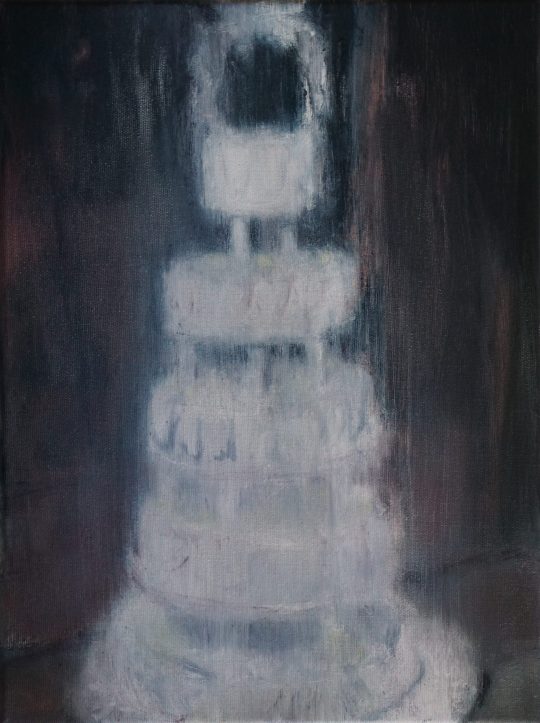
Łukasz Stokłosa, Dynasty, 2024, oil on canvas, 40×30 cm.
BRACHE: Cool.
STOKŁOSA: I see that you have one of your works behind you. What’s the subject?
BRACHE: It’s continued from my series that I did at NADA in December, which was starting with Dorothy Stratten and the Playboy Bunnies. That one’s called Purple Bunnies. I used A.I. to change the image and colors. The symbol of a woman in a bunny suit is very particular. I love Dorothy Stratten, and her biography is so tragic. I was thinking about how people perform, and I use the word performance very loosely, but the performance of how we exist on a day-to-day basis, the different layers of strata that we have with our own privacy in our own personal lives, then what goes out to the exterior. Like, she was always smiling and super happy but then at home, it was a horror. That dynamic is something I’ve been thematically mining since I started making work. When I look at the image of a woman in a bunny suit, it’s obviously manufactured for straight men. It started this mass objectification of women in this specific way that didn’t really exist before Playboy. But it looks very beautiful, so it’s complicated. But those are encaustic works. I work with silk and ink, and then I embed the silk and encaustic, and then paint oil layers on top of that. So it’s a combination of different media. And encaustic makes silk turn transparent. So the ink then floats in this one-millimeter layer, and then on top of that is the glaze. It refracts the light in a vibrant way that looks different from regular oil paintings.
STOKŁOSA: When you were talking about these beautiful images of the bunny costume, it reminded me of working with gay pornography, because I also paint these paintings with boys. It’s very similar because we have those very sexy, beautiful situations, but you know what is behind them. But I usually always use vintage porn for my work. And the interesting thing is that, at one time, that was the only place where you could see men kissing on screen, and it was accessible. So it was a place of liberation. But on the other hand, you have this exploitation of people who were basically forced to do that because of a lack of money. It’s both a feeling that something is wrong, but also that it’s so interesting and beautiful.
BRACHE: Right. It’s such a compelling feeling, to position yourself between those two spaces. Being able to hold both things that are in direct opposition to my constitution is very complex. It feels beautiful, even if it is horrible too. But comfort in discomfort is very important. Otherwise the world becomes very boring, very fast. It also betrays humanity because we all have that range within us, in some capacity.
STOKŁOSA: Yes. It’s important to remember that there are both sides in that image. It’s both bad and good, so it’s always your place to decide which side you are on. Sometimes, it’s impossible.
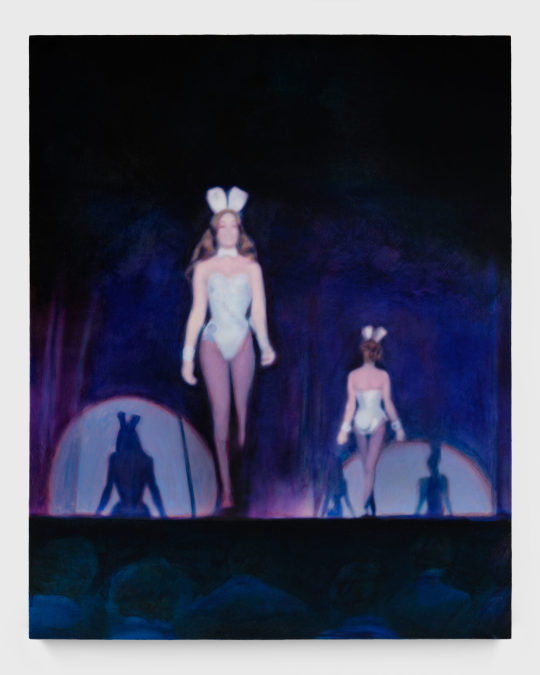
Cristine Brache. Talent Showcase. 32.75 x 26.25 x 1 5/8”. Oil, ink, and encaustic on silk and wood.
BRACHE: Yeah. Sometimes it depends on my mood, too. It’s like, “Today I’m tired of feeling objectified, and I feel all of this is violence, and I don’t like it.” But then other times, it’s like, “Oh, please objectify me..”
STOKŁOSA: Yeah. I feel the same.
BRACHE: That’s normal. Nobody wants to be objectified all the time. I don’t enjoy that, but sometimes it feels nice to be an object of someone else’s affection.
STOKŁOSA: Again, it’s this public and private situation where sometimes you are forced to be in public, but you don’t want to be.
BRACHE: Yeah, you put on the mask and perform it.
STOKŁOSA: So again, we are back in Versailles. You have to be public as a queen, but you’re this ordinary person who has feelings too. It’s not only the beautiful gold front, it’s something behind those horrible stories.
BRACHE: It’s what it takes to make that industry of the castle operate, to make it function on that very high standard of living at that time in particular. Do you have a favorite queen or king that you’re most obsessed with?
STOKŁOSA: I was obsessed with Ludwig II. He ruled in Bavaria in the late 19th century and he was responsible for those fairytale castles in the Alps. One of the Disney castles was inspired by him. It was a very tragic story because he was insane and very shy and probably gay. He was building all those palaces only for himself, he avoided people altogether. Eventually, he was killed by his servants, they drowned him in the lake.
BRACHE: Oh, wow.
STOKŁOSA: I was obsessed with the castles. Some of them were built with very modern techniques but look medieval. One was a copy of Versailles because he was obsessed with Louis XIV. It was basically a monument for him.

Amity exhibition Beautiful Fish in a Man-Made Pond at the Wohlstetter house designed by Josef Van der Kar, photograph by Evan Walsh.
BRACHE: Have you been there?
STOKŁOSA: Yes, a couple years ago. It’s on an island. It’s an exact copy of Versailles.
BRACHE: That’s wild. Personally I’m obsessed with The Devils of Loudun from France in the 17th century. Ken Russell made a movie about them called The Devils, and there’s a Polish movie about the same nun called Matka Joanna. Her name was Joan. There was a case of possession in the convents and it was an epidemic, way before the Salem witch trials. But French possessions were way more sexual than the Puritanical ones of America. So this nun, Joan, supposedly signed a pact with the devil, Grandier, the mayor of the town. There was a sex pact, and then she started behaving like she was possessed. I mean, she was for sure possessed, but I don’t know by what.
STOKŁOSA: By herself maybe? I watched this Polish movie about her, it was based on the novel by Jarosław Iwaszkiewicz [Mother Joan of the Angels].
BRACHE: Aldous Huxley wrote about it too. That’s the book that Ken Russell’s movie is based on. Ken Russell’s is the campy version, and then the Polish version is more elegant.
STOKŁOSA: Yes. It’s from the ‘50s or ‘60s, it’s black and white.
BRACHE: Yeah. I spent some time in Poland. My ex is Polish, so I was in Szczecin and Krakow. I never went to Warsaw.
STOKŁOSA: I’m from Krakow.
BRACHE: I liked it there.
STOKŁOSA: When was that?
BRACHE: 2011. A long time ago now, just after my graduation. What’s your favorite part of Poland?
STOKŁOSA: Krakow, of course. It has everything that I need. There is an airport, so I can go everywhere. The architecture is nice, and it’s varied in different parts of the city. I have my friends there, so it’s a good place to live. How long have you been in New York?
BRACHE: I’ve been here since COVID, really. I moved from Canada. I was in Canada for four years. Before that, I was in London. I did my master’s there, and before that, I lived in China for two-and-a-half years. Before that, I was traveling around Europe. I was squatting in London, and I was squatting in Greece, and I hitchhiked from Athens to the center of Turkey, and I lived in Turkey for two months. I basically left the US with two-grand and bought a one-way ticket.
STOKŁOSA: Whoa! That’s great.
BRACHE: Yeah. I wound up in China, and I was so broke when I got there. It was crazy, but it was a really great experience. That’s when I was in Poland as well. I spent a lot of time in East Germany and Berlin, all up and down Dresden and Leipzig. I drove through the Alps, and I went to Gruyere in Switzerland. That place also looked like Disney World. It was beautiful, the little villages. It looked fake to me, but it was real.

Cristine Brache, Almost Blue. 14 x 17.5 x 1 5/8”. Oil, ink and encaustic on cotton and wood, 2024.
STOKŁOSA: Sometimes all those castles and palaces look fake. You mentioned Dresden. For me it looks like a castle or palace from Beauty and the Beast.
BRACHE: It’s crazy. What are you showing in Los Angeles?
STOKŁOSA: There’s going to be one picture from Dynasty and the other is Armor from Vienna. It’s renaissance armor and it’s gold shiny objects. For me it’s about masculinity and oppression and the situation when you’re wearing this metal object and it’s defining your position and shape of your body. It’s very oppressive but on the other hand, it’s so beautiful and shiny and you are this prince on the horse.
BRACHE: That’s funny. I’m understanding Jed [Moch’s, the curator] thinking more with putting our paintings in the same room, because I am showing those bunny works. The bunny suit is definitely a kind of armor. They used to tie the corsets so tight. I mean, my work’s very feminine and yours is very masculine, but it’s masculine in a soft way. It’s like a non-toxic masculinity. People usually think of masculinity as toxic nowadays, but it’s very beautiful, too. When it’s not toxic.
STOKŁOSA: Yes. Both masculinity and femininity are defined by the same oppressive rules of society. We both are victims of that.
BRACHE: For sure. There’s definitely toxic femininity, too. There’s a yin and yang between our work.

Amity exhibition Beautiful Fish in a Man-Made Pond at the Wohlstetter house designed by Josef Van der Kar, photograph by Evan Walsh.
0 notes
Note
Pie eating?
What kind of pies are we talking?
-🦖
Dell shrugs, "Billboard says pies, so I bet it'll be some sorta fruit pies. That's usually what these sorta contests include."
Mikhail beats his fist on the window, "We have to go! Free pies! Doktor, we go for free pies!"
Ludwig sighs, "I bet there is an entrance fee, Misha. It's never just free pies."
"Cheap pies, then. And reward, da?"
Dell chuckles, "Don't get your hopes up for a prize, son. Them professional eaters ain't easy to beat. Even for a big fella like you."
"But cheap pies, Engie! Doktor, you like pies too!"
"A very specific subset of pies that I can't get here in America."
"Doktor... Tala! We go to pie eating contest together!"
6 notes
·
View notes